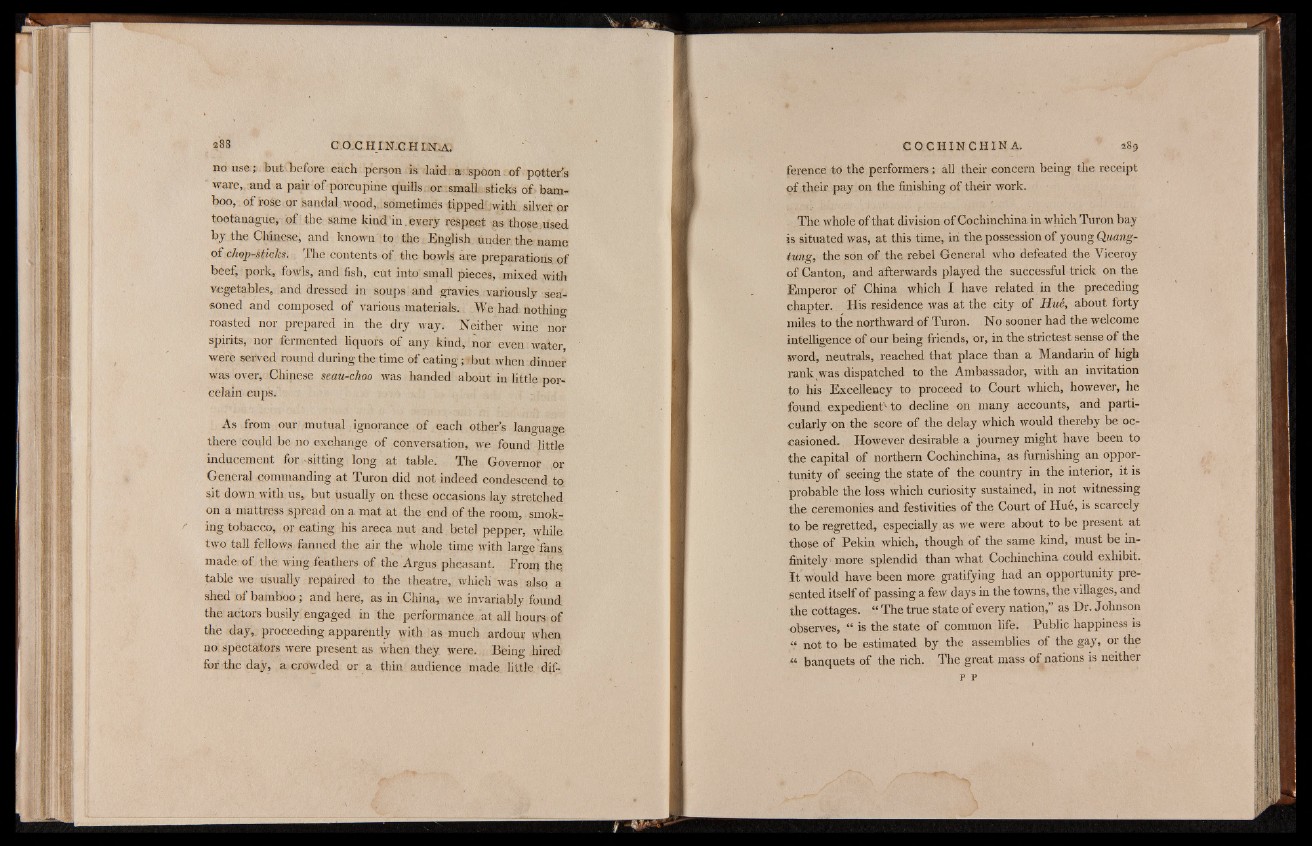
no use; but before each person is laid a spoon of potter’s
ware, and a pair of porcupine (piilis. or small sticks of bamboo,
of rose or sandal wood, sometimes tipped’.with , silver or
tootanague, of the same kind in . every respeGt as those, used
by the Chinese, and known to the English under the name
of chop-sticks. The contents of the bowls are preparations of
beef, pork, fowls, and fish, cut into small pieces, mixed with
vegetables, and dressed in soups and gravies variously seasoned
and composed of various materials. We had nothing
roasted nor prepared in the dry way. Neither wine nor
spirits, nor fermented lic|uors of any kind, nor even water
were seized round during the time of eating ;«but when dinner
was over, Chinese seau-ehoo was handed about in little porcelain
cups.
As from our mutual ignorance of each other’s language
there could be no exchange of conversation, we found little
inducement for -sitting long at table. The Governor ,or
General commanding at Turon did not indeed condescend to
sit down with us, but usually on these occasions lay stretched
on a mattress spread on a mat at the end of the room, smoking
tobacco, or eating his areca nut and betel pepper, while
two tall fellows fanned the air the whole time with large fans
made of the wing feathers of the Argus pheasant. From the,
table we usually repaired to the theatre, which was also a
shed of bamboo; and here, as in China, we invariably found,
the actors busily engaged in the performance at all hours of
the day, proceeding apparently with as much ardour when
no spectators were present as when they were. Eeing hired
for the day, a crowded or a thin audience made little difference
to the performers ; all their concern being the receipt
of their pay on the finishing of their work.
The whole of that division of Cochinchina in which Turon bay
is situated was, at this time, in the possession of young Quang-
tuns, the son of the rebel General who defeated the Viceroy O 7
of Canton, and afterwards played the successful trick on the
Emperor of China which I have related in the preceding
chapter. His residence was at the city of Hué, about forty
miles to the northward of Turon. No sooner had the welcome
intelligence of our being friends, or, in the strictest sense of the
word, neutrals, reached that place than a Mandarin of high
rank was dispatched to the Ambassador, with an invitation
to his Excellency to proceed to Court which, however, he
found expedient' to decline on many accounts, and particularly
on the score of the delay which would thereby be occasioned.
However desirable a journey might have been to
the capital of northern Cochinchina, as furnishing an opportunity
of seeing the state of the country in the interior, it is
probable the loss which curiosity sustained, in not witnessing
the ceremonies and festivities of the Court of Hué, is scarcely
to be regretted, especially as we were about to be present at
those of Pekin which, though of the same kind, must be infinitely
more splendid than what Cochinchina could exhibit.
I t would have been more gratifying had an opportunity presented
itself of passing a few days in the towns, the villages, and
the cottages. “ The true state of every nation,” as Dr. Johnson
observes, “ is the state of common life. Public happiness is
“ not to be estimated by the assemblies of the gay, or the
“ banquets of the rich. The great mass of nations is neither
p p